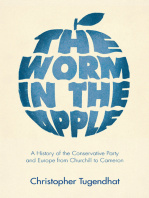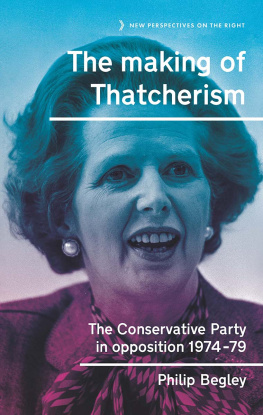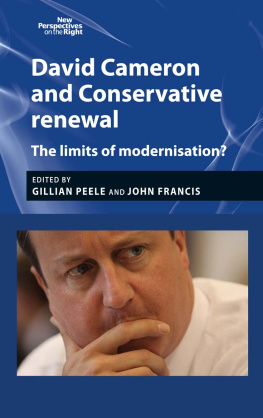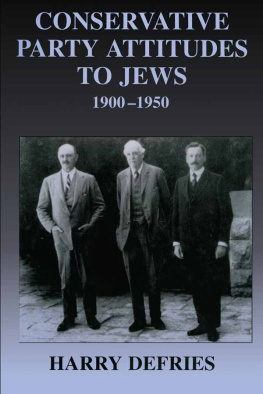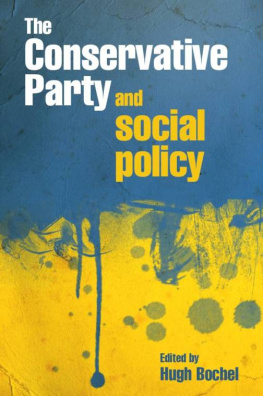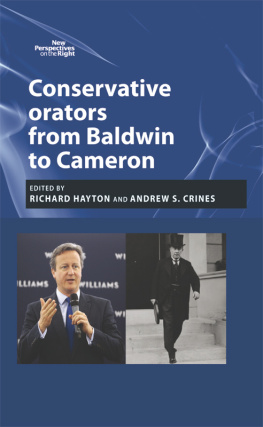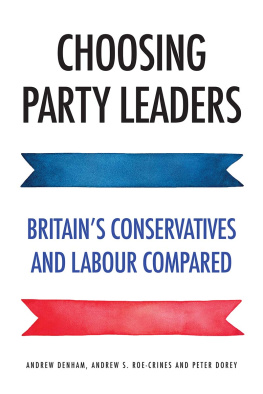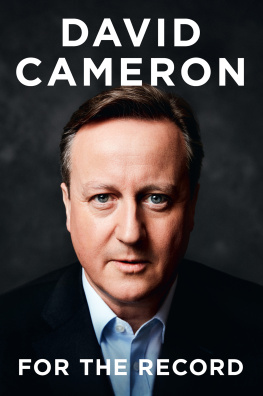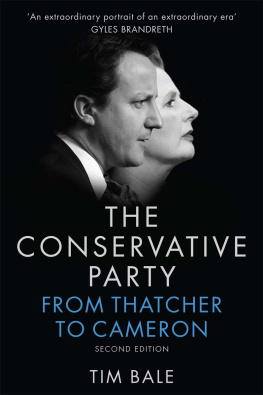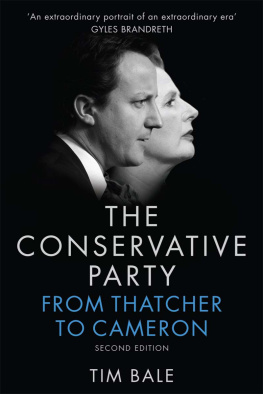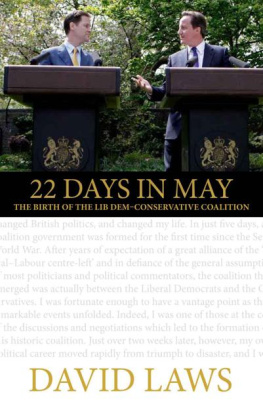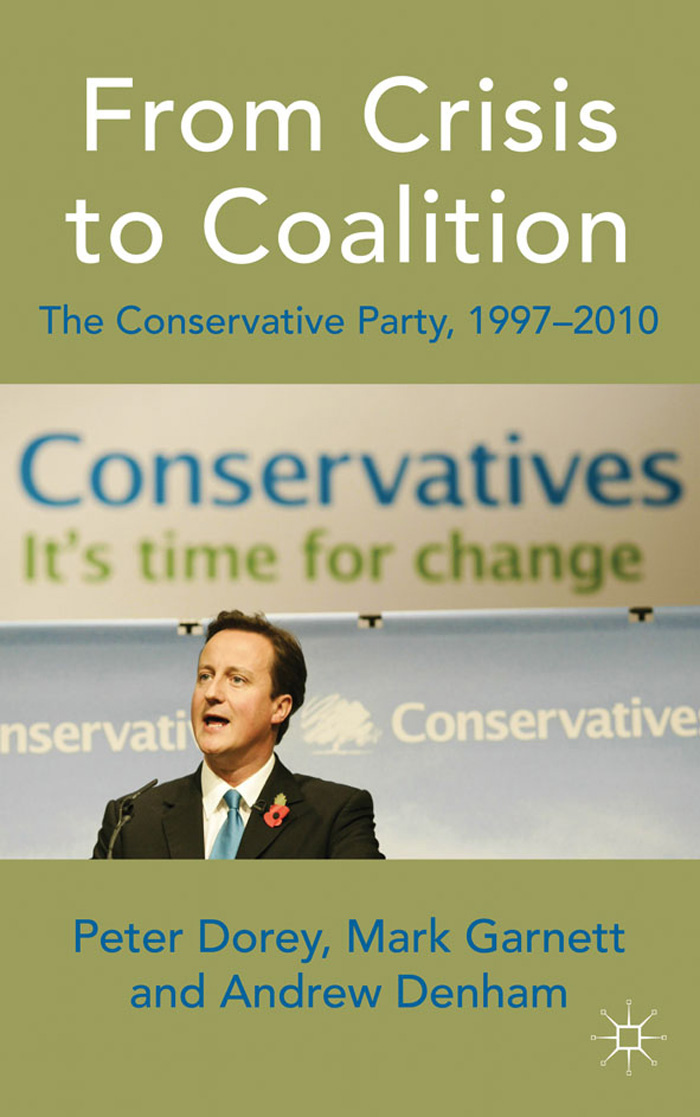From Crisis to Coalition
Also by Peter Dorey
THE CONSERVATIVE PARTY AND THE TRADE UNIONS
BRITISH CONSERVATISM AND TRADE UNIONISM, 19451964
BRITISH CONSERVATISM
The Politics and Philosophy of Inequality
THE MAJOR PREMIERSHIP, 199097
Politics and Policies under John Major (editor)
Also by Mark Garnett
EXPLORING BRITISH POLITICS (with Philip Lynch)
WHATEVER HAPPENED TO THE TORIES? (with Ian Gilmour)
SPENDID! SPLENDID!
The Authorised Biography of Willie Whitelaw (with Ian Aitken)
Also by Andrew Denham
THINK TANKS OF THE NEW RIGHT
KEITH JOSEPH
A Life (with Mark Garnett)
DEMOCRATISING CONSERVATIVE LEADERSHIP SELECTON
From Grey Suits to Grass Roots (with Kieron OHara)
From Crisis to Coalition
The Conservative Party, 19972010
Peter Dorey
Reader in British Politics, Department of Politics, Cardiff University, UK
Mark Garnett
Lecturer in Politics and International Relations, Department of Politics, Philosophy and Religion, Lancaster University, UK
and
Andrew Denham
Reader in Government, School of Politics and International Relations, University of Nottingham, UK


Peter Dorey, Mark Garnett and Andrew Denham 2011
All rights reserved. No reproduction, copy or transmission of this publication may be made without written permission.
No portion of this publication may be reproduced, copied or transmitted save with written permission or in accordance with the provisions of the Copyright, Designs and Patents Act 1988, or under the terms of any licence permitting limited copying issued by the Copyright Licensing Agency, Saffron House, 610 Kirby Street, London EC1N 8TS.
Any person who does any unauthorised act in relation to this publication may be liable to criminal prosecution and civil claims for damages.
The authors have asserted their rights to be identified as the authors of this work in accordance with the Copyright, Designs and Patents Act 1988.
First published 2011 by
PALGRAVE MACMILLAN
Palgrave Macmillan in the UK is an imprint of Macmillan Publishers Limited, registered in England, company number 785998, of Houndmills, Basingstoke, Hampshire RG21 6XS.
Palgrave Macmillan in the US is a division of St Martins Press LLC, 175 Fifth Avenue, New York, NY 10010.
Palgrave Macmillan is the global academic imprint of the above companies and has companies and representatives throughout the world.
Palgrave and Macmillan are registered trademarks in the United States, the United Kingdom, Europe and other countries.
ISBN 9780230542389
This book is printed on paper suitable for recycling and made from fully managed and sustained forest sources. Logging, pulping and manufacturing processes are expected to conform to the environmental regulations of the country of origin.
A catalogue record for this book is available from the British Library.
Library of Congress Cataloging-in-Publication Data Dorey, Peter, 1959
From crisis to coalition : the Conservative Party, 19972010 / Peter Dorey, Mark Garnett, Andrew Denham.
p. cm.
Includes index.
ISBN 9780230542389 (hardback)
1. Conservative Party (Great Britain)History20th century.
2. Conservative Party (Great Britain)History21st century.
I. Denham, Andrew. II. Garnett, Mark, 1963 III. Title.
JN1129.C7D67 2011
324.24104dc22
2011004894
10 9 8 7 6 5 4 3 2 1
20 19 18 17 16 15 14 13 12 11
Printed and bound in Great Britain by
CPI Antony Rowe, Chippenham and Eastbourne
Contents
List of Tables and Figures
Tables
Figure
Acknowledgements
Mark Garnett would like to thank David Denver for commenting on more than one chapter of the draft manuscript, and for providing the table in . Lizzie Houghton agreed to monitor media coverage of the 2010 general election, despite the fact that she was running her own campaign at the time (for the editorship of Lancasters student newspaper, SCAN). She proved equally successful in these simultaneous assignments.
Introduction
Until quite recently it was customary for academic observers of the Conservative Party to introduce their books with a rueful acknowledgement that their favourite subject was not receiving the attention that it deserved. Whatever its political fortunes, the Labour Party always seemed to take the lions share of scholarly notice. Certainly during their period of opposition between 1974 and 1979 only a handful of academics thought the Conservatives worthy of serious study, compared to the steady stream of books and articles which charted Labours chequered career during the 1970s as a whole.
Academic trends shift slowly and, even after the advent of Mrs Thatcher, Labour remained the chief focus of interest. All too often, an interest in the contemporary party was taken as evidence of overt or concealed Conservative sympathies not a wise outlook even to imply, when only 17 per cent of academics supported the party in the 1987 general election (compared to a quarter of the unemployed).
True, the electoral defeats of 1945, 1966 and (February and October) 1974 had been deeply damaging; but on none of these occasions could it be argued plausibly that the existence of the party was at stake. In contrast, the 1997 defeat was magnified into a crisis because everyone except the Conservatives themselves realised that the party would have to renew itself if it hoped to regain its former status as the natural party of government. The widespread complacency which retained its grip over the party until November 2003, when Iain Duncan Smith was dethroned as leader without fighting a general election, meant that by that time there were sound reasons for thinking that the Conservatives were on course for extinction.
The present volume aims to provide students of British politics, and general readers with a survey of the key developments within the Conservative Party since the election of 1 May 1997 the wake-up call which for so long went unheeded. To understand why the party collapsed in such a spectacular fashion, a concise overview of previous events is inescapable not least because the partys history between 1975 and 1992 is so often misunderstood. There has been a tendency, even among former opponents of Thatcherism, to follow New Labour in accepting that, love it or hate it, the ideological position of the Conservative leadership formed an essential ingredient in the partys four consecutive victories of 1979, 1983, 1987 and 1992.
Indeed, as Philip Norton revealed in a key article published in 1990, Thatcherites constituted only a minority (19 per cent) of the parliamentary Conservative Party a decade after Mrs Thatcher became prime minister. They made up for their lack of numbers by their intellectual confidence, organisational strength and links to New Right think-tanks. By contrast, 18 per cent of Conservative MPs and ministers were
Since this contemporary evidence was disregarded by Thatchers opponents, it is hardly surprising that it made so little impact on the Conservatives themselves. As a result, the party readily embraced an intellectualist fallacy, convincing itself that the ideas which had earned it the reputation of the nasty party had actually ensured both electoral victories and policy successes during the 1980s. William Hague (19972001) and Iain Duncan Smith (20013) were incapable of appreciating the depth of public misgivings about Thatcherism; and although Michael Howard (20035) acknowledged the problem to a greater degree, his political career had prospered under Mrs Thatcher and he was unable to carry through the ideological transformation which some commentators (and ambitious young Conservative politicians) had sought to promote. examines the record of the party in elections and opinion polls, and shows that, even after a third consecutive defeat in 2005, the Conservatives were still a long distance from convincing the voters that they could be trusted in office further, arguably, than Labour had been in 1987, since in 2005 the Conservatives failed to unseat a discredited government whereas in 1987 Labour had confronted Thatcher at the height of her ideological triumphalism.


